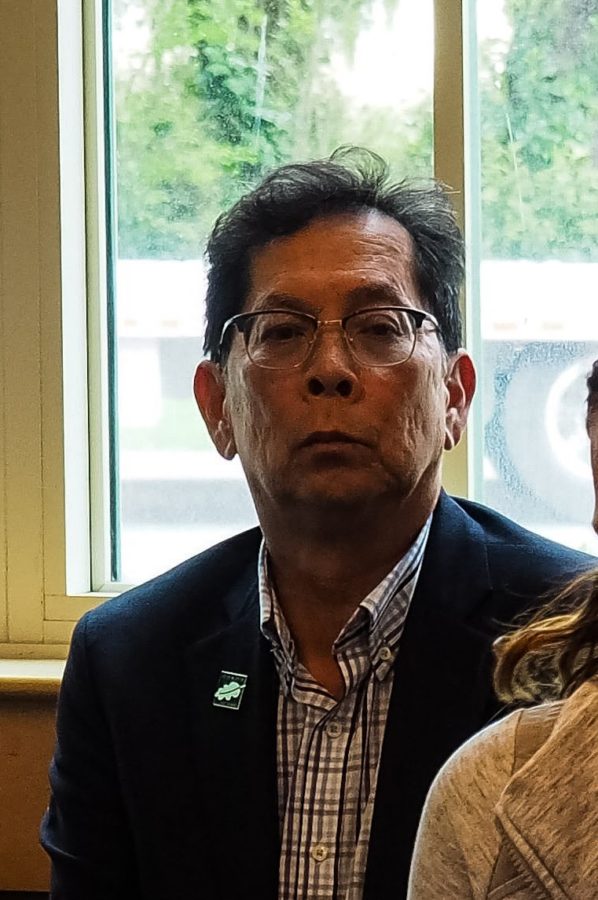Editor’s note: To receive updates on this story and other breaking news, please download the Oak Leaf mobile app for Apple or Android.
After arguably his roughest week as Santa Rosa Junior College president, Dr. Frank Chong reflected on the now-reversed summer cuts plan, the Academic Senate’s no-confidence vote and the college’s budget deficit, saying his administration had some big changes to make.
Students, faculty and staff reacted in outrage after Senior Vice President Mary Kay Rudolph’s March 29 announcement that the majority of planned summer courses would be cut to save $2 million to offset a projected $6.5 million budget deficit. Chong sent a campus-wide email the next day that suggested the decision would be reversed.
Chong announced a definitive reversal of the decision in an email following his meeting with the advisory President’s Consultation Council (PCC), which includes members from campus governmental bodies, including student government.
The president, who spent most of last week fielding questions and comments from an angry and confused campus community, struck the same conciliatory tone when he spoke with The Oak Leaf last Friday.
“At some point, we have to stop storming and get to the real issues,” he said.
“We have a $6.5 million deficit we have to address, and we honestly thought summer was a way. We didn’t know it would have such an adverse impact on students, obviously. When the firestorm came around the ill-conceived decision, we heard from the students and faculty, and we basically reversed the decision immediately.”
Students held a sit in outside Chong’s office last Monday to protest the summer cuts.
The campus community questioned the motives of the decision; some said it was a demonstration of political might amid strained faulty salary negotiations and others said it showed how out of touch the administration is with students.
Chong said the administration’s sole motivation was to address the projected budget deficit.
“I just think with the stress of trying to get to a better place with the budget, there was a lapse. It was a costly lapse, not just for me but for [students],” he said.
The SRJC president and superintendent also said his administration has done a poor job communicating the severity of the crisis to the community, and that the school had become too “top down.”
Director of Fiscal Services Kate Jolley, who replaced Senior Vice President of Finance Doug Roberts as chief budget overseer following the cuts scandal, is scheduled to deliver budget presentations at the Board of Trustees and Academic Senate meetings this week, according to Chong.
“I’m doing a reset with our budget analysis and our budget person,” Chong said. “So Kate Jolley will now be in charge of the budget.”
Chong said he made the decision after talking to faculty who didn’t have faith in Roberts.
Community members have accused Roberts and Rudolph, who are retiring this year, of pushing the agenda through senior management. Chong denied this claim.
“They had input, but ultimately I made the decision. When you are so-called ‘on-the-top,’ you have to take the heat.”
The Academic Senate voted to pass a no-confidence resolution for Chong, Rudolph and Roberts last week.
The SGA voted to present a similar resolution to the Board of Trustees today. The board will assess Chong’s leadership in closed session at their monthly meeting tomorrow.
Chong didn’t argue the Academic Senate’s no-confidence vote.
“I think the no-confidence vote is valid,” he said. “I accept it, and I appreciate the Academic Senate giving me the opportunity to try and correct course.”
The Student Government Assembly (SGA) passed a similar measure April 9. President Evelyn Navarro will present the finalized resolution to the board tomorrow.
Although calls for Chong’s termination have circulated in faculty and staff email chains, the majority of faculty and staff members expressed they were ready to embrace the president after last week’s “paradigm shift.”
The president said the school has tough decisions to make, but restated his commitment to run SRJC transparently.
Chong said attempts to increase enrollment rates, which determine the school’s budget, have failed over the last four years.
Potential students have to balance attending the JC with the opportunity of working in a booming Sonoma County, Chong said. The county’s unemployment rate is only 3 percent at a time when cost of living is skyrocketing.
“If we’re not going to cut summer school, what are we going to cut? The reality of the story I’m trying to tell the college community is that with the fires and, with the changing demographics, the number of full-time students is dropping. We’re acting like a larger college but we’re really a smaller college.”
The administration is considering alternative measures to address the budget, but they all involve making cuts to classes or personnel. Chong said he’s looking to streamline the administration, which has about 100 full-time employees and makes up 11 percent of the school’s budget.
He warned that there may not be an easy answer to solving the budget crisis and policies to address the deficit may negatively affect some students.
“What’s the best way to reduce the budget where it doesn’t hurt the students?” Chong said. “I don’t know that there’s a way to do that.”





